Sodium-glucose co-transporter protein 2 (SGLT2) inhibitors for people with chronic kidney disease and diabetes
- PMID: 38770818
- PMCID: PMC11106805
- DOI: 10.1002/14651858.CD015588.pub2
Sodium-glucose co-transporter protein 2 (SGLT2) inhibitors for people with chronic kidney disease and diabetes
Abstract
Background: Diabetes is associated with high risks of premature chronic kidney disease (CKD), cardiovascular diseases, cardiovascular death and impaired quality of life. People with diabetes are more likely to develop kidney impairment, and approximately one in three adults with diabetes have CKD. People with CKD and diabetes experience a substantially higher risk of cardiovascular outcomes. Sodium-glucose co-transporter protein 2 (SGLT2) inhibitors have shown potential effects in preventing kidney and cardiovascular outcomes in people with CKD and diabetes. However, new trials are emerging rapidly, and evidence synthesis is essential to summarising cumulative evidence.
Objectives: This review aimed to assess the benefits and harms of SGLT2 inhibitors for people with CKD and diabetes.
Search methods: We searched the Cochrane Kidney and Transplant Register of Studies up to 17 November 2023 using a search strategy designed by an Information Specialist. Studies in the Register are continually identified through regular searches of CENTRAL, MEDLINE, and EMBASE, conference proceedings, the International Clinical Trials Registry Platform (ICTRP) Search Portal and ClinicalTrials.gov.
Selection criteria: Randomised controlled studies were eligible if they evaluated SGLT2 inhibitors versus placebo, standard care or other glucose-lowering agents in people with CKD and diabetes. CKD includes all stages (from 1 to 5), including dialysis patients.
Data collection and analysis: Two authors independently extracted data and assessed the study risk of bias. Treatment estimates were summarised using random effects meta-analysis and expressed as a risk ratio (RR) or mean difference (MD), with a corresponding 95% confidence interval (CI). Confidence in the evidence was assessed using the Grading of Recommendations Assessment, Development and Evaluation (GRADE) approach. The primary review outcomes were all-cause death, 3-point and 4-point major adverse cardiovascular events (MACE), fatal or nonfatal myocardial infarction (MI), fatal or nonfatal stroke, and kidney failure.
Main results: Fifty-three studies randomising 65,241 people with CKD and diabetes were included. SGLT2 inhibitors with or without other background treatments were compared to placebo, standard care, sulfonylurea, dipeptidyl peptidase-4 (DPP-4) inhibitors, or insulin. In the majority of domains, the risks of bias in the included studies were low or unclear. No studies evaluated the treatment in children or in people treated with dialysis. No studies compared SGLT2 inhibitors with glucagon-like peptide-1 receptor agonists or tirzepatide. Compared to placebo, SGLT2 inhibitors decreased the risk of all-cause death (20 studies, 44,397 participants: RR 0.85, 95% CI 0.78 to 0.94; I2 = 0%; high certainty) and cardiovascular death (16 studies, 43,792 participants: RR 0.83, 95% CI 0.74 to 0.93; I2 = 29%; high certainty). Compared to placebo, SGLT2 inhibitors probably make little or no difference to the risk of fatal or nonfatal MI (2 studies, 13,726 participants: RR 0.95, 95% CI 0.80 to 1.14; I2 = 24%; moderate certainty), and fatal or nonfatal stroke (2 studies, 13,726 participants: RR 1.07, 95% CI 0.88 to 1.30; I2 = 0%; moderate certainty). Compared to placebo, SGLT2 inhibitors probably decrease 3-point MACE (7 studies, 38,320 participants: RR 0.89, 95% CI 0.81 to 0.98; I2 = 46%; moderate certainty), and 4-point MACE (4 studies, 23,539 participants: RR 0.82, 95% CI 0.70 to 0.96; I2 = 77%; moderate certainty), and decrease hospital admission due to heart failure (6 studies, 28,339 participants: RR 0.70, 95% CI 0.62 to 0.79; I2 = 17%; high certainty). Compared to placebo, SGLT2 inhibitors may decrease creatinine clearance (1 study, 132 participants: MD -2.63 mL/min, 95% CI -5.19 to -0.07; low certainty) and probably decrease the doubling of serum creatinine (2 studies, 12,647 participants: RR 0.70, 95% CI 0.56 to 0.89; I2 = 53%; moderate certainty). SGLT2 inhibitors decrease the risk of kidney failure (6 studies, 11,232 participants: RR 0.70, 95% CI 0.62 to 0.79; I2 = 0%; high certainty), and kidney composite outcomes (generally reported as kidney failure, kidney death with or without ≥ 40% decrease in estimated glomerular filtration rate (eGFR)) (7 studies, 36,380 participants: RR 0.68, 95% CI 0.59 to 0.78; I2 = 25%; high certainty) compared to placebo. Compared to placebo, SGLT2 inhibitors incur less hypoglycaemia (16 studies, 28,322 participants: RR 0.93, 95% CI 0.89 to 0.98; I2 = 0%; high certainty), and hypoglycaemia requiring third-party assistance (14 studies, 26,478 participants: RR 0.75, 95% CI 0.65 to 0.88; I2 = 0%; high certainty), and probably decrease the withdrawal from treatment due to adverse events (15 studies, 16,622 participants: RR 0.94, 95% CI 0.82 to 1.08; I2 = 16%; moderate certainty). The effects of SGLT2 inhibitors on eGFR, amputation and fracture were uncertain. No studies evaluated the effects of treatment on fatigue, life participation, or lactic acidosis. The effects of SGLT2 inhibitors compared to standard care alone, sulfonylurea, DPP-4 inhibitors, or insulin were uncertain.
Authors' conclusions: SGLT2 inhibitors alone or added to standard care decrease all-cause death, cardiovascular death, and kidney failure and probably decrease major cardiovascular events while incurring less hypoglycaemia compared to placebo in people with CKD and diabetes.
Trial registration: ClinicalTrials.gov NCT02836873 NCT01032629 NCT01989754 NCT03242018 NCT02532855 NCT02065791 NCT03036150 NCT03036124 NCT04350593 NCT01730534 NCT02547935 NCT02268214 NCT02460978 NCT02413398 NCT03594110 NCT01370005 NCT01159600 NCT01177813 NCT01131676 NCT01210001 NCT01164501 NCT03057951 NCT03057977 NCT03078101 NCT01193218 NCT01294423 NCT00663260 NCT01316094 NCT01646320 NCT01137474 NCT02682563 NCT00683878 NCT03315143 NCT03521934 NCT01381887 NCT01986881 NCT01986855 NCT03436693 NCT01195662 NCT00673231 NCT01555008 NCT00528879 NCT00855166 NCT00968812 NCT01031680 NCT00528372 NCT00688701 NCT01512849 NCT00984867 NCT01042977 NCT04243850 NCT02096705 NCT05359263 NCT04662723 NCT04061200 NCT04238702 NCT01167881.
Copyright © 2024 The Cochrane Collaboration. Published by John Wiley & Sons, Ltd.
Conflict of interest statement
Patrizia Natale: no relevant interests were disclosed
David Tunnicliffe: no relevant interests were disclosed
Suetonia Plamer: no relevant interests were disclosed
Tadashi Toyama: no relevant interests were disclosed
Valeria Saglimbene: no relevant interests were disclosed
Marinella Ruospo: no relevant interests were disclosed
Giovanni Stallone: no relevant interests were disclosed
Letizia Gargano: no relevant interests were disclosed
Loreto Gesualdo: received research funding from SANOFI PASTEUR INC (University of Bari: Grant / Contract), and is an independent contractor (consultant to GlaxoSmithKline, Travere Therapeutics, Inc., Novartis, Medtronic, and AstraZeneca)
Giovanni FM Strippoli: no relevant interests were disclosed
Figures

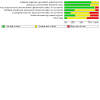
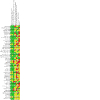





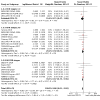
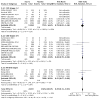

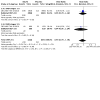





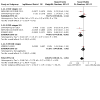

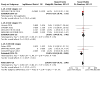
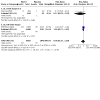



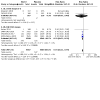

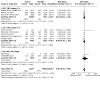
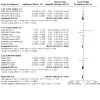
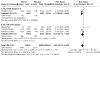
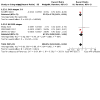
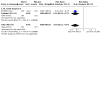
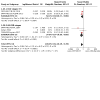
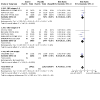


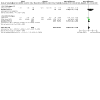





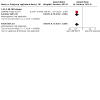
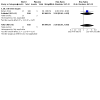




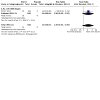
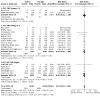


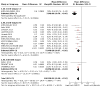


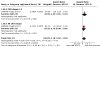
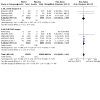






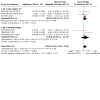






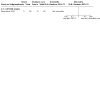










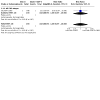




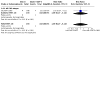

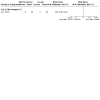


Update of
References
References to studies included in this review
Allegretti 2019 {published data only}
-
- Allegretti A, Thurber T, Zhang W, Zhou W, Freeman M, Halvorsen Y. Safety and effectiveness of bexagliflozin in type 2 diabetes mellitus and stage 3a/3b CKD: a phase 3 randomized clinical trial [abstract no: FR-OR144]. Journal of the American Society of Nephrology 2018;29:B1.
CANVAS Program 2017 {published and unpublished data}
-
- Bays H, Van Gaal L, Aravind SR, Aggarwal N, Violante R, Slee A, et al. Improved cardiovascular and renal outcomes in the canagliflozin cardiovascular assessment study (CANVAS) program irrespective of baseline (BL) body mass index (BMI) [abstract no: 1206-P]. Diabetes 2018;67(Suppl 1):A324. [EMBASE: 623566374]
-
- Figtree GA, Radholm K, Barrett TD, Perkovic V, Mahaffey KW, Zeeuw D, et al. Effects of canagliflozin on heart failure outcomes associated with preserved and reduced ejection fraction in type 2 diabetes mellitus. Circulation 2019;129(32):2591-3. [PMID: ] - PubMed
-
- Li J, Neal B, Perkovic V, De Zeeuw D, Simpson R, Oh R, et al. How does canagliflozin confer renoprotection? Results from a mediation analysis of the CANVAS program [abstract no: FR-PO232]. Journal of the American Society of Nephrology 2019;30:494. [EMBASE: 633768434]
-
- Li J, Neal B, Perkovic V, Zeeuw D, Neuen BL, Arnott C, et al. Mediators of the effects of canagliflozin on kidney protection in patients with type 2 diabetes. Kidney International 2020;98(3):769-77. [PMID: ] - PubMed
Cherney 2021 {published data only}
-
- Cherney D, Ferrannini E, Umpierrez GE, Peters AL, Rosenstock J, Carroll AK, et al. Efficacy and safety of sotagliflozin (SOTA) in patients with type 2 diabetes (T2D) and moderate renal impairment [abstract no: 136-LB]. Diabetes 2020;69(Suppl 1). [EMBASE: 633380580]
-
- Cherney DZ, Ferrannini E, Umpierrez GE, Peters AL, Rosenstock J, Carroll AK, et al. Efficacy and safety of sotagliflozin in patients with type 2 diabetes and severe renal impairment. Diabetes Obesity Metabolism 2021;23(12):2632-42. [PMID: ] - PubMed
CompoSIT‐R 2018 {published data only}
-
- Raji A, Scott R, Morgan J, Zimmer Z, Lam RL, O'Neill EA, et al. Safety and efficacy of sitagliptin compared with dapagliflozin in patients with type 2 diabetes, mild renal impairment, and inadequate glycaemic control on metformin +/- a sulfonylurea [abstract no: 774]. Diabetologia 2018;61(Suppl 1):S379-80. [EMBASE: 624032226]
-
- Raji A, Xu ZJ, Lam RL, O'Neill EA, Kaufman KD, Engel SS. Efficacy and safety of sitagliptin compared with dapagliflozin in people >= 65 years old with type 2 diabetes and mild renal insufficiency. Diabetes Therapy Research, Treatment & Education of Diabetes & Related Disorders 2020;11(10):2419-28. [PMID: ] - PMC - PubMed
-
- Scott R, Morgan J, Zimmer Z, Lam RL, O'Neill EA, Kaufman KD, et al. A randomized clinical trial of the efficacy and safety of sitagliptin compared with dapagliflozin in patients with type 2 diabetes mellitus and mild renal insufficiency: The CompoSIT-R study. Diabetes, Obesity & Metabolism 2018;20(12):2876-84. [PMID: ] - PMC - PubMed
-
- Scott RS, Morgan JD, Zimmer Z, Lam RL, O'Neill EA, Kaufman KD, et al. Safety and efficacy of sitagliptin (SITA) compared with dapagliflozin (DAPA) in subjects with T2D, mild renal impairment, and inadequate glycemic control on metformin (MET) +/- a sulfonylurea (SU) [abstract no: 1142-P]. Diabetes 2018;67(Suppl 1):A306. [EMBASE: 623565838]
CREDENCE 2017 {published data only}
-
- Arnott C, Li JW, Cannon CP, Zeeuw D, Neuen BL, Heerspink HJ, et al. The effects of canagliflozin on heart failure and cardiovascular death by baseline participant characteristics: Analysis of the CREDENCE trial. Diabetes, Obesity & Metabolism 2021;23(7):1652-9. [PMID: ] - PubMed
-
- Bakris G, Oshima M, Mahaffey KW, Agarwal R, Cannon CP, Capuano G, et al. Effects of canagliflozin in patients with baseline eGFR <30 ml/min per 1.73 m2: subgroup analysis of the randomized CREDENCE trial. Clinical Journal of the American Society of Nephrology: CJASN 2020;15(12):1705-14. [PMID: ] - PMC - PubMed
-
- Bakris G, Oshima M, Mahaffey KW, Brenner BM, Charytan DM, Levin A, et al. Canagliflozin (CANA) slows declines in kidney function in people with baseline (BL) eGFR <30 mL/min/1.73 m2 [abstract NO: TH-PO1202]. In: Available at asn-online.org/education/kidneyweek/2019/program-abstract.aspx?controlId.... 2019.
-
- Bakris GL, Jardine MJ, Zhou Z, Heerspink HJ, Li Q, Agarwal R, et al. Renal, cardiovascular (CV), and safety outcomes of canagliflozin (CANA) according to baseline albuminuria: a CREDENCE secondary analysis [abstract no: PO-0953]. Journal of the American Society of Nephrology 2020;31:328. [EMBASE: 633704046]
-
- Cannon CP, Perkovic V, Agarwal R, Baldassarre J, Bakris G, Charytan DM, et al. Evaluating the effects of canagliflozin on cardiovascular and renal events in patients with type 2 diabetes mellitus and chronic kidney disease according to baseline HbA1c, including those with HbA1c <7%: results from the CREDENCE trial. Circulation 2020;141(5):407-10. [PMID: ] - PubMed
DAPA‐CKD 2020 {published data only}
-
- Chertow GM, Vart P, Jongs N, Toto RD, Gorriz JL, Hou FF, et al. The effect of dapagliflozin in patients with eGFR <30 mL/min/1.73m2: findings from the DAPA-CKD trial [abstract no: POS-831]. Kidney International Reports 2021;6(4 Suppl):S361-2. [EMBASE: 2011683439]
-
- Chertow GM, Vart P, Langkilde AM, McMurray J, Correa-Rotter R, Rossing P, et al. Quetelet (body mass) index and effects of dapagliflozin in CKD [abstract no: PO2366]. Journal of the American Society of Nephrology 2021;32(Abstract Suppl):725. [EMBASE: 636328430]
-
- Correa-Rotter R, Chertow GM, Mark PB, Nowicki MP, Vart P, Jongs N, et al. Effects of dapagliflozin in patients with CKD, with and without diabetes, by use and non-use of cardiovascular medications: DAPA-CKD Trial [abstract no: PO2365]. Journal of the American Society of Nephrology 2021;32. [EMBASE: 636328343]
-
- Correa-Rotter R, Vart P, Jongs N, Hou FF, Chertow GM, Langkilde AM, et al. DAPA-CKD: a regional analysis of kidney and cardiovascular outcomes [abstract no: PO2364]. Journal of the American Society of Nephrology 2021;32(Abstract Suppl):724. [EMBASE: 636328228]
DAPA‐HF 2019 {published data only}
-
- Kristensen SL, Docherty KF, Jhund P, Bengtsson O, Inzucchi SE, Kosiborod M, et al. Dapagliflozin reduces the risk of hyperkalaemia in patients with heart failure and reduced ejection fraction: a secondary analysis from DAPA-HF [abstract no: FR-OR19]. Journal of the American Society of Nephrology 2020;31:21. [EMBASE: 633698811]
-
- McMurray JJ, DeMets DL, Inzucchi SE, Kober L, Kosiborod MN, Langkilde AM, et al. A trial to evaluate the effect of the sodium-glucose co-transporter 2 inhibitor dapagliflozin on morbidity and mortality in patients with heart failure and reduced left ventricular ejection fraction (DAPA-HF). European Journal of Heart Failure 2019;21(5):665-75. [MEDLINE: ] - PMC - PubMed
-
- McMurray JJ, DeMets DL, Inzucchi SE, Kober L, Kosiborod MN, Langkilde AM, et al. The Dapagliflozin And Prevention of Adverse-outcomes in Heart Failure (DAPA-HF) trial: baseline characteristics. European Journal of Heart Failure 2019;21(11):1402-11. [MEDLINE: ] - PubMed
-
- McMurray JJ, Solomon SD, Inzucchi SE, Kober L, Kosiborod MN, Martinez FA, et al. Dapagliflozin in patients with heart failure and reduced ejection fraction. New England Journal of Medicine 2019;381(21):1995-2008. [MEDLINE: ] - PubMed
DARE‐19 2021 {published data only}
-
- Kosiborod M, Berwanger O, Koch GG, Martinez F, Mukhtar O, Verma S, et al. Effects of dapagliflozin on prevention of major clinical events and recovery in patients with respiratory failure because of COVID-19: Design and rationale for the DARE-19 study. Diabetes Obesity Metabolism 2021;23(4):886-96. [PMID: ] - PMC - PubMed
-
- Kosiborod MN, Esterline R, Furtado RH, Oscarsson J, Gasparyan SB, Koch GG, et al. Dapagliflozin in patients with cardiometabolic risk factors hospitalised with COVID-19 (DARE-19): a randomised, double-blind, placebo-controlled, phase 3 trial. The Lancet Diabetes & Endocrinology 2021;9(9):586-94. [PMID: ] - PMC - PubMed
DECLARE‐TIMI 58 2018 {published data only}
-
- Bajaj HS, Raz I, Mosenzon O, Murphy SA, Rozenberg A, Yanuv I, et al. Cardiovascular and renal benefits of dapagliflozin in patients with short and long-standing type 2 diabetes: Analysis from the DECLARE-TIMI 58 trial. Diabetes Obesity & Metabolism 2020;22(7):1122-31. [PMID: ] - PubMed
-
- Bonaca MP, Wiviott SD, Zelniker TA, Mosenzon O, Bhatt DL, Leiter LA, et al. Dapagliflozin and cardiac, kidney, and limb outcomes in patients with and without peripheral artery disease in DECLARE-TIMI 58. Circulation 2020;142(8):734-47. [MEDLINE: ] - PubMed
-
- Cahn A, Mosenzon O, Wiviott SD, Rozenberg A, Yanuv I, Goodrich EL, et al. Efficacy and safety of dapagliflozin in the elderly: analysis from the DECLARE-TIMI 58 study. Diabetes Care 2020;43(2):468-75. [MEDLINE: ] - PubMed
-
- Cahn A, Mosenzon O, Wiviott SD, Rozenberg A, Yanuv I, Goodrich EL, et al. Efficacy and safety of dapagliflozin in the elderly: analysis from the DECLARE-TIMI 58 study. Diabetes Care 2020;43(2):468-75. [PMID: ] - PubMed
-
- Cahn A, Raz I, Bonaca M, Mosenzon O, Murphy SA, Yanuv I, et al. Safety of dapagliflozin in a broad population of patients with type 2 diabetes: Analyses from the DECLARE-TIMI 58 study. Diabetes Obesity & Metabolism 2020;22(8):1357-68. [PMID: ] - PubMed
DELIGHT 2019 {published data only}
-
- Pollock C, Stefansson B, Reyner D, Rossing P, Sjostrom CD, Wheeler DC, et al. Albuminuria-lowering effect of dapagliflozin alone and in combination with saxagliptin and effect of dapagliflozin and saxagliptin on glycaemic control in patients with type 2 diabetes and chronic kidney disease (DELIGHT): a randomised, double-blind, placebo-controlled trial. The Lancet Diabetes & Endocrinology 2019;7(6):429-41. [MEDLINE: ] - PubMed
-
- Pollock C, Wheeler DC, Rossing P, Sjostrom D, Stefansson B, Reyner D, et al. Effects of dapagliflozin and dapagliflozin plus saxagliptin on hba1c and albuminuria in patients with type 2 diabetes and chronic kidney disease: phase ii/iii DELIGHT study [abstract no: SAT-300]. Kidney International Reports 2019;4(7 Suppl):S133-4. [EMBASE: 2002179980]
DEPICT‐1&2 2017 {published data only}
-
- Dandona P, Mathieu C, Phillip M, Hansen L, Griffen SC, Tschope D, et al. Efficacy and safety of dapagliflozin in patients with inadequately controlled type 1 diabetes (DEPICT-1): 24 week results from a multicentre, double-blind, phase 3, randomised controlled trial. The Lancet Diabetes & Endocrinology 2017;5(11):864-76. [MEDLINE: ] - PubMed
-
- Dandona P, Mathieu C, Phillip M, Hansen L, Tschöpe D, Thoren F, et al. Efficacy and safety of dapagliflozin in patients with inadequately controlled type 1 diabetes: the DEPICT-1 52-week study. Diabetes Care 2018;41(12):2552-9. [MEDLINE: ] - PubMed
-
- Groop PH, Dandona P, Phillip M, Gillard P, Edelman S, Jendle J, et al. Effect of dapagliflozin as an adjunct to insulin over 52 weeks in individuals with type 1 diabetes: post-hoc renal analysis of the DEPICT randomised controlled trials. The Lancet Diabetes & Endocrinology 2020;8(10):845-54. [MEDLINE: ] - PubMed
-
- Groop PH, Dandona P, Phillip M, Gillard P, Edelman S, Jendle J, et al. Effect of dapagliflozin as an adjunct to insulin over 52 weeks in individuals with type 1 diabetes: post-hoc renal analysis of the DEPICT randomised controlled trials. The Lancet Diabetes & Endocrinology 2020;8(10):845-54. [MEDLINE: ] - PubMed
-
- Groop PH, Dandona P, Phillip M, Gillard P, Edelman S, Jendle J, et al. Effect of dapagliflozin as an adjunct to insulin over 52 weeks in individuals with type 1 diabetes: post-hoc renal analysis of the DEPICT randomised controlled trials. The Lancet Diabetes & Endocrinology 2020;8(10):845-54. [MEDLINE: ] - PubMed
DERIVE 2018 {published data only}
-
- Fioretto P, Del Prato S, Buse JB, Goldenberg R, Giorgino F, Reyner D, et al. Efficacy and safety of dapagliflozin in patients with type 2 diabetes and moderate renal impairment (chronic kidney disease stage 3A): The DERIVE Study. Diabetes, Obesity & Metabolism 2018;20(11):2532-40. [MEDLINE: ] - PMC - PubMed
DIA3004 2013 {published and unpublished data}
-
- Bakris G, Yale JF, Wajs E, Li X, Usiskin K, Meininger G. Efficacy and safety of canagliflozin (CANA) in subjects with type 2 diabetes mellitus (t2dm) and moderate renal impairment [abstract no: TH-PO536]. Journal of the American Society of Nephrology 2012;23(Abstracts):220A.
-
- Nieto Iglesias J, Yale JF, Bakris G, Cariou B, Wajs E, Figueroa K, et al. Efficacy and safety of canagliflozin in subjects with type 2 diabetes mellitus and chronic kidney disease over 52 weeks [abstract no: 951]. Diabetologia 2013;56(Suppl 1):S381. [EMBASE: 71439373]
-
- Yale J, Bakris G, Cariou B, Iglesias JN, Wajs E, Figueroa K, et al. Efficacy and safety of canagliflozin (CANA) in subjects with type 2 diabetes mellitus (T2DM) and chronic kidney disease (CKD) over 52 weeks [abstract]. Diabetes 2013;62(Suppl 1):A277-8. [EMBASE: 71287507]
-
- Yale JF, Bakris G, Cariou B, Nieto Iglesias J, Wajs E, Figueroa K, et al. Efficacy and safety of canagliflozin (CANA) in subjects with type 2 diabetes mellitus T2DM) and chronic kidney disease (CKD) over 52 weeks [abstract no: 71]. Canadian Journal of Diabetes 2015;37(Suppl 4):S27. [EMBASE: 71210511]
-
- Yale JF, Bakris G, Cariou B, Nieto J, David-Neto E, Yue D, et al. Efficacy and safety of canagliflozin over 52 weeks in patients with type 2 diabetes mellitus and chronic kidney disease. Diabetes, Obesity & Metabolism 2014;16(10):1016-27. [MEDLINE: ] - PubMed
Eickhoff 2018 {published data only}
-
- Eickhoff M, Frimodt-Moller M, Rye JN, Rossing P, Persson F. Effect of dapagliflozin on albuminuria and the renin-angiotensin system when added to renin-angiotensin blockade in patients with type 2 diabetes and nephropathy [abstract no: SP417]. Nephrology Dialysis Transplantation 2018;33(Suppl 1):i488. [EMBASE: 622605920]
-
- Eickhoff MK, Frimodt-Moller M, Jorgensen NR, Rossing P, Persson F. Effects of dapagliflozin on albuminuria, renal function, and renin-angiotensin-aldosterone hormones in type 2 diabetes [abstract no: SA-PO138]. Journal of the American Society of Nephrology 2018;29(Abstract Suppl):770. [EMBASE: 633731561]
-
- Eickhoff MK, Olsen FJ, Frimodt-Moller M, Diaz LJ, Faber J, Jensen MT, et al. Effect of dapagliflozin on cardiac function and biomarkers in patients with type 2 diabetes and albuminuria- a randomized study [abstract no: SA-PO139]. Journal of the American Society of Nephrology 2018;29(Abstract Suppl):770. [EMBASE: 633731617]
EMPA‐Kidney 2023 {published data only}2017‐002971‐24
EMPA‐REG BP 2015 {published data only}
-
- Cherney D, Cooper M, Tikkanen I, Crowe S, Johansen OE, Lund SS, et al. Contrasting influences of renal function on blood pressure and HbA1c reductions with empagliflozin in patients with type 2 diabetes and hypertension [abstract no: 16709]. Circulation 2014;130(Suppl 2). [EMBASE: 71710726]
-
- Cherney D, Cooper M, Tikkanen I, Crowe S, Johansen OE, Lund SS, et al. Contrasting influences of renal function on blood pressure and HbA1c reductions with empagliflozin in patients with type 2 diabetes and hypertension [abstract no: 4B.01]. Journal of Hypertension 2015;33(Suppl 1):e53. [EMBASE: 71934754]
-
- Mancia G, Cannon CP, Tikkanen I, Zeller C, Ley L, Woerle HJ, et al. Impact of empagliflozin on blood pressure in patients with type 2 diabetes mellitus and hypertension by background antihypertensive medication. Hypertension 2016;68(6):1355-64. [MEDLINE: ] - PubMed
-
- Tikkanen I, Narko K, Zeller C, Green A, Salsali A, Broedl UC, et al. Empagliflozin reduces blood pressure in patients with type 2 diabetes and hypertension. Diabetes Care 2015;38(3):420-8. [MEDLINE: ] - PubMed
EMPA‐REG MET 2013 {published data only}
-
- Haring HU, Merker L, Seewaldt-Becker E, Weimer M, Meinicke T, Broedl UC, et al. Empagliflozin as add-on to metformin for 24 weeks improves glycemic control in patients with type 2 diabetes (T2DM) [abstract no: 1092-P]. Diabetes 2013;62(Suppl 1):A282. [EMBASE: 71287523]
-
- Haring HU, Merker L, Seewaldt-Becker E, Weimer M, Meinicke T, Broedl UC, et al. Empagliflozin as add-on to metformin in patients with type 2 diabetes: a 24-week, randomized, double-blind, placebo-controlled trial. Diabetes Care 2014;37(6):1650-9. [MEDLINE: ] - PubMed
-
- Haring HU, Merker L, Seewaldt-Becker E, Weimer M, Meinicke T, Woerle HJ, et al. Empagliflozin as add-on to metformin plus sulfonylurea (SU) for 24 weeks improves glycemic control in patients with type 2 diabetes (T2DM) [abstract no: 1082-P]. Diabetes 2013;62(Suppl 1):A279. [EMBASE: 71287513]
EMPA‐REG MONO 2013 {published data only}2009‐016243‐20
-
- Roden M, Weng J, Eilbracht J, Delafont B, Kim G, Woerle HJ, et al. Empagliflozin monotherapy with sitagliptin as an active comparator in patients with type 2 diabetes: a randomised, double-blind, placebo-controlled, phase 3 trial. The Lancet Diabetes & Endocrinology 2013;1(3):208-19. [MEDLINE: ] - PubMed
EMPA‐REG OUTCOME 2013 {published data only (unpublished sought but not used)}2009‐016178‐33
-
- Bohm M, Fitchett D, Ofstad AP, Brueckmann M, Kaspers S, George JT, et al. Heart failure and renal outcomes according to baseline and achieved blood pressure in patients with type 2 diabetes: results from EMPA-REG OUTCOME. Journal of Hypertension 2020;38(9):1829-40. [PMID: ] - PubMed
-
- Butler J, Zannad F, Fitchett D, Zinman B, Koitka-Weber A, Eynatten M, et al. Empagliflozin improves kidney outcomes in patients with or without heart failure. Circulation: Heart Failure 2019;12(6):e005875. [PMID: ] - PubMed
-
- Cherney DZ, Zinman B, Inzucchi SE, Koitka-Weber A, Mattheus M, Eynatten M, et al. Effects of empagliflozin on the urinary albumin-to-creatinine ratio in patients with type 2 diabetes and established cardiovascular disease: an exploratory analysis from the EMPA-REG OUTCOME randomised, placebo-controlled trial. The Lancet Diabetes & Endocrinology 2017;5(8):610-21. [MEDLINE: ] - PubMed
-
- Cooper ME, Inzucchi SE, Zinman B, Hantel S, Von Eynatten M, Wanner C, et al. Does glucose control influence the effect of empagliflozin on kidney outcomes in type 2 diabetes (T2D)? Insight from the EMPA-REG OUTCOME Trial [abstract no: TH-OR036]. Journal of the American Society of Nephrology 2018;29(Abstract Suppl):10. [EMBASE: 633737621]
-
- Cooper ME, Inzucchi SE, Zinman B, Hantel S, Eynatten M, Wanner C, et al. Glucose control and the effect of empagliflozin on kidney outcomes in type 2 diabetes: an analysis from the EMPA-REG OUTCOME trial. American Journal of Kidney Diseases 2019;74(5):713-5. [MEDLINE: ] - PubMed
EMPA‐REG PIO 2014 {published data only}2009‐016154‐40
-
- Kovacs CS, Seshiah V, Swallow R, Jones R, Rattunde H, Woerle HJ, et al. Empagliflozin improves glycaemic and weight control as add-on therapy to pioglitazone or pioglitazone plus metformin in patients with type 2 diabetes: a 24-week, randomized, placebo-controlled trial. Diabetes, Obesity & Metabolism 2014;16(2):147-58. [MEDLINE: ] - PubMed
EMPA‐REG RENAL 2014 {published and unpublished data}
-
- Barnett AH, Mithal A, Manassie J, Jones R, Rattunde H, Woerle HJ, et al. A phase III trial of empagliflozin in patients with type 2 diabetes with stage 2 or 3 chronic kidney disease (EMPA-REG RENAL) [abstract no: P120]. Diabetic Medicine 2014;31(Suppl 1):63. [EMBASE: 71554443]
-
- Barnett AH, Mithal A, Manassie J, Jones R, Rattunde H, Woerle HJ, et al. Efficacy and safety of empagliflozin added to existing antidiabetes treatment in patients with type 2 diabetes and chronic kidney disease: a randomised, double-blind, placebo-controlled trial. The Lancet Diabetes & Endocrinology 2014;2(5):369-84. [MEDLINE: ] - PubMed
-
- Barnett AH, Mithal A, Manassie J, Jones R, Rattunde H, Woerle HJ, et al. Empagliflozin in patients with type 2 diabetes mellitus (T2DM) and renal impairment (RI) [abstract]. Diabetes 2013;62(Suppl 1):A286. [EMBASE: 71287535]
-
- Mithal A, Barnett AH, Manassie J, Jones R, Rattunde H, Woerle HJ, et al. Empagliflozin in patients with type 2 diabetes mellitus and stage 3A, 3B and 4 chronic kidney disease (CKD) [abstract no: 952]. Diabetologia 2013;56(Suppl 1):S382. [EMBASE: 71439374]
EMPEROR‐Preserved 2019 {published data only}
-
- Anker SD, Butler J, Filippatos G, Ferreira JP, Bocchi E, Böhm M, et al. Empagliflozin in heart failure with a preserved ejection fraction. New England Journal of Medicine 2021;385(16):1451-61. [PMID: ] - PubMed
-
- Anker SD, Butler J, Filippatos GS, Jamal W, Salsali A, Schnee J, et al. Evaluation of the effects of sodium-glucose co-transporter 2 inhibition with empagliflozin on morbidity and mortality in patients with chronic heart failure and a preserved ejection fraction: rationale for and design of the EMPEROR-Preserved Trial. European Journal of Heart Failure 2019;21(10):1279-87. [MEDLINE: ] - PubMed
-
- Packer M, Butler J, Zannad F, Pocock SJ, Filippatos G, Ferreira JP, et al. Empagliflozin and major renal outcomes in heart failure. New England Journal of Medicine 2021;385(16):1531-3. [PMID: ] - PubMed
EMPEROR‐Reduced 2020 {published data only}
-
- Ferreira JP, Zannad F, Pocock SJ, Anker SD, Butler J, Filippatos G, et al. Interplay of mineralocorticoid receptor antagonists and empagliflozin in heart failure: EMPEROR-Reduced. Journal of the American College of Cardiology 2021;77(11):1397-407. [PMID: ] - PubMed
-
- Filippatos G, Anker SD, Butler J, Farmakis D, Ferreira JP, Gollop ND, et al. Effects of empagliflozin on cardiovascular and renal outcomes in heart failure with reduced ejection fraction according to age: a secondary analysis of EMPEROR-Reduced. European Journal of Heart Failure 2022;24(12):2297-304. [MEDLINE: ] - PMC - PubMed
-
- Packer M, Anker SD, Butler J, Filippatos G, Ferreira JP, Pocock SJ, et al. Effect of empagliflozin on the clinical stability of patients with heart failure and a reduced ejection fraction: the EMPEROR-Reduced trial [Erratum in: Circulation. 2021 Jan 26;143(4):e30]. Circulation 2021;143(4):326-36. [PMID: ] - PMC - PubMed
EMPRA 2022 {published data only}2016‐002935‐14
-
- Antlanger M, Domenig O, Kaltenecker CC, Kovarik JJ, Rathkolb V, Muller MM, et al. Combined sodium glucose co-transporter-2 inhibitor and angiotensin-converting enzyme inhibition upregulates the renin-angiotensin system in chronic kidney disease with type 2 diabetes: results of a randomized, double-blind, placebo-controlled exploratory trial. Diabetes, Obesity & Metabolism 2022;24(5):816-26. [PMID: ] - PMC - PubMed
Haneda 2016 {published data only}111507111543
-
- Haneda M, Seino Y, Inagaki N, Kaku K, Sasaki T, Fukatsu A, et al. Influence of renal function on the 52-week efficacy and safety of the sodium glucose cotransporter 2 inhibitor luseogliflozin in Japanese patients with type 2 diabetes mellitus. Clinical Therapeutics 2016;38(1):66-88. [MEDLINE: ] - PubMed
He 2021 {published data only}
-
- He Y, Pachori A, Chen P, Ma S, Mendonza AE, Amer A, et al. Glucosuric, renal and haemodynamic effects of licogliflozin, a dual inhibitor of sodium-glucose co-transporter-1 and sodium-glucose co-transporter-2, in patients with chronic kidney disease: a randomized trial. Diabetes, Obesity and Metabolism 2021;23(5):1182-90. [MEDLINE: ] - PubMed
Ikeda 2019 {published data only}111572
-
- Ikeda S, Takano Y, Schwab D, Portron A, Kasahara-Ito N, Saito T, et al. Effect of renal impairment on the pharmacokinetics and pharmacodynamics of tofogliflozin (a selective SGLT2 Inhibitor) in patients with type 2 diabetes mellitus. Drug Research 2019;69(6):314-22. [PMID: ] - PubMed
IMPROVE 2017 {published data only}
-
- Dekkers C, Gansevoort RT, Kramers BJ, Lambers Heerspink HJ. Effects of the SGLT-2 inhibitor dapagliflozin on volume status in patients with type 2 diabetes and elevated albuminuria [abstract no: SA-PO137]. Journal of the American Society of Nephrology 2018;29(Abstract Suppl):770. [EMBASE: 633735792]
-
- Dekkers C, Petrykiv S, Laverman GD, Gansevoort RT, Lambers Heerspink HJ. Effect of the SGLT-2 inhibitor dapagliflozin on glomerular and tubular injury markers [abstract no: FR-OR090]. Journal of the American Society of Nephrology 2017;28(Abstract Suppl):60. [EMBASE: 633700485]
-
- Lambers Heerspink HJ, Petrykiv S, Laverman GD, Zeeuw D. Does SGLT2 inhibition with dapagliflozin overcome therapy resistance to RAAS inhibition? [abstract no: FR-PO641]. Journal of the American Society of Nephrology 2017;28(Abstract Suppl):569. [EMBASE: 633702950]
Jian 2018 {published data only}
-
- Jian X, Yang QL, Xiao S, Jing Z, Hu SD. The effects of a sodium-glucose cotransporter 2 inhibitor on diabetic nephropathy and serum oxidized low-density lipoprotein levels. European Review for Medical & Pharmacological Sciences 2018;22(12):3994-9. [MEDLINE: ] - PubMed
Kadowaki 2014 {published data only}
-
- Kadowaki T, Haneda M, Inagaki N, Terauchi Y, Taniguchi A, Koiwai K, et al. Empagliflozin monotherapy in Japanese patients with type 2 diabetes mellitus: a randomized, 12-week, double-blind, placebo-controlled, phase II trial. Advances in Therapy 2014;31(6):621-38. [MEDLINE: ] - PubMed
Kaku 2014 {published data only}
-
- Kaku K, Kiyosue A, Inoue S, Ueda N, Tokudome T, Yang J, et al. Efficacy and safety of dapagliflozin monotherapy in Japanese patients with type 2 diabetes inadequately controlled by diet and exercise. Diabetes, Obesity & Metabolism 2014;16(11):1102-10. [MEDLINE: ] - PubMed
Kohan 2014 {published and unpublished data}
-
- Dekkers CC, Wheeler DC, Sjostrom CD, Stefansson BV, Cain V, Heerspink HJ. Effects of the sodium-glucose co-transporter 2 inhibitor dapagliflozin in patients with type 2 diabetes and Stages 3b-4 chronic kidney disease [Erratum in: Nephrol Dial Transplant. 2018 Jul 1;33(7):1280]. Nephrology Dialysis Transplantation 2018;33(11):2005-11. [PMID: ] - PMC - PubMed
-
- Kohan DE, Firescu C, List JF, Tang W. Efficacy and safety of dapagliflozin in patients with type 2 diabetes and moderate renal impairment [abstract no: TH-PO524]. Journal of the American Society of Nephrology 2011;22(Abstracts):232-3A.
-
- Stefansson B, Fioretto P, Johnson E, Cain V, Sjostrom D. Dapagliflozin reduces allbuminuria over 2 years in diabetic patients with renal impairment [abstract no: TH-OR001]. Journal of the American Society of Nephrology 2015;26:1A.
LANTERN 2015 {published data only}
-
- Kashiwagi A, Takahashi H, Ishikawa H, Yoshida S, Kazuta K, Utsuno A, et al. A randomized, double-blind, placebo-controlled study on long-term efficacy and safety of ipragliflozin treatment in patients with type 2 diabetes mellitus and renal impairment: results of the long-term ASP1941 safety evaluation in patients with type 2 diabetes with renal impairment (LANTERN) study. Diabetes, Obesity & Metabolism 2015;17(2):152-60. [MEDLINE: ] - PMC - PubMed
Maldonado 2019 {published data only}
-
- Maldonado M, Cherney D, Frederich R, Liu J, Pong A, Xu J, et al. Effects of ertugliflozin on UACR and eGFR in patients with type 2 diabetes (T2D) and CKD stage 3 [abstract no: SAT-291]. Kidney International Reports 2019;4(7 Suppl):S130. [EMBASE: 2002179217]
Mathieu 2015 {published data only}
-
- Del Prato S, Rosenstock J, Garcia-Sanchez R, Iqbal N, Hansen L, Johnsson E, et al. Safety and tolerability of dapagliflozin, saxagliptin and metformin in combination: Post-hoc analysis of concomitant add-on versus sequential add-on to metformin and of triple versus dual therapy with metformin. Diabetes, Obesity & Metabolism 2018;20(6):1542-6. [PMID: ] - PMC - PubMed
-
- Mathieu C, Ranetti AE, Li D, Ekholm E, Cook W, Hirshberg B, et al. Randomized, double-blind, phase 3 trial of triple therapy with dapagliflozin add-on to saxagliptin plus metformin in type 2 diabetes. Diabetes Care 2015;38(11):2009-17. [PMID: ] - PubMed
Nandula 2021 {published data only}
NCT01137474 {published data only}
-
- A study of BMS-512148 (dapagliflozin) in patients with type 2 diabetes and inadequately controlled hypertension on an angiotensin-converting enzyme inhibitor or angiotensin receptor blocker. www.clinicaltrials.gov/ct2/show/results/NCT01137474.
Nishimura 2015 {published data only}142548
-
- Jinnouchi H, Nozaki K, Watase H, Omiya H, Sakai S, Samukawa Y. Impact of reduced renal function on the glucose-lowering effects of luseogliflozin, a selective SGLT2 inhibitor, assessed by continuous glucose monitoring in Japanese patients with type 2 diabetes mellitus. Advances in Therapy 2016;33(3):460-79. [MEDLINE: ] - PMC - PubMed
-
- Nishimura R, Osonoi T, Kanada S, Jinnouchi H, Sugio K, Omiya H, et al. Effects of luseogliflozin, a sodium-glucose co-transporter 2 inhibitor, on 24-h glucose variability assessed by continuous glucose monitoring in Japanese patients with type 2 diabetes mellitus: a randomized, double-blind, placebo-controlled, crossover study. Diabetes, Obesity & Metabolism 2015;17(8):800-4. [MEDLINE: ] - PMC - PubMed
RED 2020 {published data only}
-
- Bommel EJ, Muskiet MH, Baar MJ, Tonneijck L, Smits MM, Emanuel AL, et al. The renal hemodynamic effects of the SGLT2 inhibitor dapagliflozin are caused by post-glomerular vasodilatation rather than pre-glomerular vasoconstriction in metformin-treated patients with type 2 diabetes in the randomized, double-blind RED trial. Kidney International 2020;97(1):202-12. [PMID: ] - PubMed
Rosenstock 2012 {published data only}
-
- Rosenstock J, Vico M, Wei L, Salsali A, List J. Dapagliflozin added-on to pioglitazone reduces HbA1c and mitigates weight gain with low incidence of hypoglycemia in type 2 diabetes [abstract]. Diabetes 2011;60(Suppl 1):A270. [EMBASE: 70628757]
-
- Vico M, Wei L, Salsali A, List JF, Rosenstock J. Dapagliflozin added-on to pioglitazone is effective in improving glycaemic control and attenuates weight gain without increasing hypoglycaemia in patients with type 2 diabetes [abstract no: 851]. Diabetologia 2011;54(Suppl 1):S347-8. [EMBASE: 70562996]
Satirapoj 2019 {published data only}20180424002
-
- Korkiatpitak P, Satirapoj B, Nata N, Chaiprasert A, Tasanavipas P, Tangwonglert T, et al. Effect of SGLT-2 inhibitors to proximal tubular function and injury in patients with type 2 diabetes: a randomized controlled trial [abstract no: FR-OR089]. Journal of the American Society of Nephrology 2017;28:60. [EMBASE: 633700466]
SCORED 2020 {published data only}
-
- Bhatt DL, Szarek M, Pitt B, Cannon CP, Leiter LA, McGuire DK, et al. Sotagliflozin in patients with diabetes and chronic kidney disease. New England Journal of Medicine 2021;384(2):129-39. [PMID: ] - PubMed
Seino 2015 {published data only}111507
SOLOIST‐WHF 2021 {published data only}
-
- Bhatt DL, Szarek M, Steg PG, Cannon CP, Leiter LA, McGuire DK, et al. Sotagliflozin in patients with diabetes and recent worsening heart failure. New England Journal of Medicine 2021;384(2):117-28. [PMID: ] - PubMed
-
- Szarek M, Bhatt DL, Steg PG, Cannon CP, Leiter LA, McGuire DK, et al. Effect of sotagliflozin on total hospitalizations in patients with type 2 diabetes and worsening heart failure: a randomized trial. Annals of Internal Medicine 2021;174(8):1065-72. [PMID: ] - PubMed
Stein 2014 {published data only}
-
- Stein P, Berg JK, Morrow L, Polidori D, Artis E, Rusch S, et al. Canagliflozin, a sodium glucose co-transporter 2 inhibitor, reduces post-meal glucose excursion in patients with type 2 diabetes by a non-renal mechanism: results of a randomized trial. Metabolism: Clinical & Experimental 2014;63(10):1296-303. [MEDLINE: ] - PubMed
Takashima 2018 {published data only}000031454
-
- Maruyama T, Takashima H, Tei R, Furukawa T, Maruyama N, Abe M. Efficacy and safety of canagliflozin, a sodium glucose cotransporter 2 (SGLT2) inhibitor, in diabetic kidney disease: a randomized open-label prospective trial [abstract no: MON-300]. Kidney International Reports 2019;4(7 Suppl):S422-3. [EMBASE: 2002180065]
-
- Takashima H, Yoshida Y, Nagura C, Furukawa T, Tei R, Maruyama T, et al. Renoprotective effects of canagliflozin, a sodium glucose cotransporter 2 inhibitor, in type 2 diabetes patients with chronic kidney disease: A randomized open-label prospective trial. Diabetes & Vascular Disease Research 2018;15(5):469-72. [MEDLINE: ] - PubMed
Tanaka 2020 {published data only}000016563
-
- Tanaka M, Yamakage H, Inoue T, Odori S, Kusakabe T, Shimatsu A, et al. Beneficial effects of ipragliflozin on the renal function and serum uric acid levels in Japanese patients with type 2 diabetes: a randomized, 12-week, open-label, active-controlled trial. Internal Medicine 2020;59(5):601-9. [PMID: ] - PMC - PubMed
VERTIS‐CV 2020 {published data only}
-
- Budoff MJ, Davis TM, Palmer AG, Frederich R, Lawrence DE, Liu J, et al. Efficacy and safety of ertugliflozin in patients with type 2 diabetes inadequately controlled by metformin and sulfonylurea: a sub-study of VERTIS CV. Diabetes Therapy Research, Treatment and Education of Diabetes and Related Disorders 2021;12(5):1279-97. [PMID: ] - PMC - PubMed
-
- Cannon CP, McGuire DK, Pratley R, Dagogo-Jack S, Mancuso J, Huyck S, et al. Design and baseline characteristics of the eValuation of ERTugliflozin effIcacy and Safety CardioVascular outcomes trial (VERTIS-CV). American Heart Journal 2018;206:11-23. [PMID: ] - PubMed
-
- Cannon CP, Pratley R, Dagogo-Jack S, Mancuso J, Huyck S, Masiukiewicz U, et al. Cardiovascular outcomes with ertugliflozin in type 2 diabetes. New England Journal of Medicine 2020;383(15):1425-35. [PMID: ] - PubMed
-
- Cherney D, Charbonnel B, Cosentino F, Pratley RE, Dagogo-Jack S, Shih WJ, et al. Effect of ertugliflozin on initial eGFR decline and chronic slope: Analyses from the VERTIS CV trial [abstract no: PO2629]. Journal of the American Society of Nephrology 2020;31:B5-6. [EMBASE: 633696657]
-
- Cherney D, Charbonnel B, Cosentino F, Pratley RE, Dagogo-Jack S, Shih WJ, et al. Worsening kidney disease influences the efficacy of ertugliflozin on glucosuria-mediated endpoints but does not influence the efficacy on natriuresis-related endpoints: prespecified analyses from VERTIS CV [abstract no: POS-354]. Kidney International Reports 2021;6(4 Suppl):S154-5. [EMBASE: 2011684330]
VERTIS RENAL 2018 {published data only}
-
- Grunberger G, Camp S, Johnson J, Huyck S, Terra SG, Mancuso JP, et al. Ertugliflozin in patients with stage 3 chronic kidney disease and type 2 diabetes mellitus: the VERTIS RENAL randomized study. Diabetes Therapy Research, Treatment and Education of Diabetes and Related Disorders 2018;9(1):49-66. [MEDLINE: ] - PMC - PubMed
-
- Maldonado M, Cherney D, Frederich R, Liu J, Pong A, Xu J, et al. Effects of ertugliflozin on uacr and eGFR in patients with type 2 diabetes (T2D) and CKD stage 3 [abstract no: SAT-291]. Kidney International Reports 2019;4(7 Suppl):S130. [EMBASE: 2002179217]
Wada 2022 {published data only}
-
- Wada T, Mori-Anai K, Takahashi A, Matsui T, Inagaki M, Iida M, et al. Effect of canagliflozin on the decline of estimated glomerular filtration rate in chronic kidney disease patients with type 2 diabetes mellitus: a multicenter, randomized, double-blind, placebo-controlled, parallel-group, phase III study in Japan. Journal of Diabetes Investigation 2022;13(12):1981-9. [MEDLINE: ] - PMC - PubMed
Weber 2016 {published data only}
-
- Weber MA, Mansfield TA, Alessi F, Iqbal N, Parikh S, Ptaszynska A. Effects of dapagliflozin on blood pressure in hypertensive diabetic patients on renin-angiotensin system blockade. Blood Pressure 2016;25(2):93-103. [MEDLINE: ] - PubMed
-
- Weber MA, Mansfield TA, Cain VA, Iqbal N, Parikh S, Ptaszynska A. Blood pressure and glycaemic effects of dapagliflozin versus placebo in patients with type 2 diabetes on combination antihypertensive therapy: a randomised, double-blind, placebo-controlled, phase 3 study. The Lancet Diabetes & Endocrinology 2016;4(3):211-20. [MEDLINE: ] - PubMed
Wilding 2012 {published data only}
-
- Soler NG, Wilding JPH, Woo V, Pahor A, Sugg J, Langkilde A, et al. Dapagliflozin lowered rate of insulin uptitration/study discontinuation from lack of glycaemic control in 48-week study of type 2 diabetes patients poorly controlled on insulin therapy [abstract]. Diabetologia 2010;53(Suppl 1):S348-9. [EMBASE: 70262912]
-
- Wilding J, Woo V, Soler NG, Pahor A, Sugg J, Parikh S. Sustained effectiveness of dapagliflozin over 48 weeks in patients with type 2 diabetes poorly controlled with insulin [abstract no: 21-LB]. Diabetes 2010. [EMBASE: 71600158]
-
- Wilding JP, Woo V, Pahor A, Sugg J, Langkilde A, Parikh S. Effect of dapagliflozin, a novel insulin-independent treatment, over 48 weeks in patients with type 2 diabetes poorly controlled with insulin [abstract]. Diabetologia 2010;53(Suppl 1):S348. [EMBASE: 70262911]
-
- Wilding JP, Woo V, Rohwedder K, Sugg J, Parikh S. Dapagliflozin in patients with type 2 diabetes receiving high doses of insulin: efficacy and safety over 2 years. Diabetes, Obesity & Metabolism 2014;16(2):124-36. [MEDLINE: ] - PubMed
-
- Wilding JP, Woo V, Soler NG, Pahor A, Sugg J, Parikh S. Dapagliflozin in patients with type 2 diabetes poorly controlled on insulin therapy-efficacy of a novel insulin-independent treatment [abstract]. Diabetes 2010. [EMBASE: 71600266]
Zambrowicz 2015 {published data only}
-
- Zambrowicz B, Lapuerta P, Strumph P, Banks P, Wilson A, Ogbaa I, et al. LX4211 therapy reduces postprandial glucose levels in patients with type 2 diabetes mellitus and renal impairment despite low urinary glucose excretion. Clinical Therapeutics 2015;37(1):71-82. [MEDLINE: ] - PubMed
References to studies excluded from this review
Bailey 2010 {published data only}
-
- Bailey CJ, Gross JL, Hennicken D, Iqbal N, Mansfield TA, List JF. Dapagliflozin add-on to metformin in type 2 diabetes inadequately controlled with metformin: a randomized, double-blind, placebo-controlled 102-week trial [Erratum appears in BMC Med. 2013;11:193]. BMC Medicine 2013;11:43. [MEDLINE: ] - PMC - PubMed
-
- Bailey CJ, Gross JL, Pieters A, Bastien A, List JF. Effect of dapagliflozin in patients with type 2 diabetes who have inadequate glycaemic control with metformin: a randomised, double-blind, placebo-controlled trial. Lancet 2010;375(9733):2223-33. [MEDLINE: ] - PubMed
-
- Bailey CJ, Gross JL, Yadav M, Iqbal N, Mansfield TA, List JF. Long-term efficacy of dapagliflozin as add-on to metformin (MET) in T2DM inadequately controlled with MET alone [abstract no: 988-P]. Diabetes 2011;60(Suppl 1):A271. [EMBASE: 70628759]
-
- Bailey CJ, Gross JL, Yadav M, Iqbal N, Mansfield TA, List JF. Sustained efficacy of dapagliflozin when added to metformin in type 2 diabetes inadequately controlled by metformin monotherapy [abstract no: 146]. Diabetologia 2011;54(Suppl 1):S67. [EMBASE: 70562291]
Bolinder 2012 {published data only}
-
- Bolinder J, Ljunggren O, Johansson L, Wilding J, Langkilde AM, Sjostrom CD, et al. Dapagliflozin maintains glycaemic control while reducing weight and body fat mass over 2 years in patients with type 2 diabetes mellitus inadequately controlled on metformin. Diabetes, Obesity & Metabolism 2014;16(2):159-69. [MEDLINE: ] - PubMed
-
- Bolinder J, Ljunggren O, Kullberg J, Johansson L, Wilding J, Langkilde AM, et al. Effects of dapagliflozin on body weight, total fat mass, and regional adipose tissue distribution in patients with type 2 diabetes mellitus with inadequate glycemic control on metformin. Journal of Clinical Endocrinology & Metabolism 2012;97(3):1020-31. [MEDLINE: ] - PubMed
-
- Ljunggren O, Bolinder J, Johansson L, Wilding J, Langkilde AM, Sjostrom CD, et al. Dapagliflozin has no effect on markers of bone formation and resorption or bone mineral density in patients with inadequately controlled type 2 diabetes mellitus on metformin. Diabetes, Obesity & Metabolism 2012;14(11):990-9. [MEDLINE: ] - PubMed
CANTATA‐SU 2013 {published data only}
-
- Cefalu WT, Leiter LA, Yoon KH, Arias P, Niskanen L, Xie J, et al. Efficacy and safety of canagliflozin versus glimepiride in patients with type 2 diabetes inadequately controlled with metformin (CANTATA-SU): 52 week results from a randomised, double-blind, phase 3 non-inferiority trial. Lancet 2013;382(9896):941-50. [MEDLINE: ] - PubMed
-
- Heerspink HJL, Desai M, Jardine M, Meininger G, Perkovic V. Canagliflozin slows progression of renal function decline independent of glycaemic effects [abstract]. Diabetologia 2016;59(1 Suppl 1):S28. [EMBASE: 612313272]
-
- Lambers Heerspink HJ, Perco P, Mulder S, Leierer J, Hansen MK, Heinzel A, et al. Canagliflozin induced reduction in TNF receptor 1 is associated with a reduction in eGRF decline [abstract no: TH-OR038]. Journal of the American Society of Nephrology 2018;29(Abstract Suppl):10.
-
- Leiter LA, Langslet G, Cefalu WT, Ho YK, Arias P, Xie J, et al. Canagliflozin demonstrates durable glycemic improvements over 104 weeks compared with glimepiride in subjects with type 2 diabetes mellitus on metformin [abstract]. Canadian Journal of Diabetes 2013;37(Suppl 4):S27. [EMBASE: 71210510]
Cefalu 2015 {published data only}
-
- Cefalu WT, Leiter LA, Debruin TW, Gausenilsson I, Sugg J, Parikh SJ. Dapagliflozin treatment for type 2 diabetes mellitus patients with comorbid cardiovascular disease and hypertension [abstract no: 1056-P]. Diabetes 2012;61(Suppl 1):A271. [EMBASE: 70797650]
-
- Cefalu WT, Leiter LA, Bruin TW, Gause-Nilsson I, Sugg J, Parikh SJ. Dapagliflozin's effects on glycemia and cardiovascular risk factors in high-risk patients with type 2 diabetes: a 24-week, multicenter, randomized, double-blind, placebo-controlled study with a 28-week extension. Diabetes Care 2015;38(7):1218-27. [MEDLINE: ] - PMC - PubMed
DIAMOND 2020 {published data only}
-
- Cherney DZ, Dekkers CC, Barbour SJ, Cattran D, Abdul Gafor AH, Greasley PJ, et al. Effects of the SGLT2 inhibitor dapagliflozin on proteinuria in non-diabetic patients with chronic kidney disease (DIAMOND): a randomised, double-blind, crossover trial. Lancet Diabetes & Endocrinology 2020;8(7):582-93. [MEDLINE: ] - PubMed
-
- Dekkers C, Cherney D, Reich HN, Barbour S, Gafor AHA, Lim SK, et al. Design and patient characteristics of a study to assess the renoprotective effects of the SGLT2 inhibitor dapagliflozin in non-diabetic proteinuric kidney disease (DIAMOND) [abstract]. Journal of the American Society of Nephrology 2019;30:232. [EMBASE: 633767851]
-
- Heerspink HJ, Dekkers C, Cherney D. Effects of the SGLT2 inhibitor dapagliflozin on proteinuria in non-diabetic patients with CKD (DIAMOND): A randomized double-blind cross-over trial [abstract]. Journal of the American Society of Nephrology 2020;31(Abstract Suppl):229. [EMBASE: 633703583]
-
- Sen T, Scholtes R, Greasley PJ, Cherney DZ, Dekkers CC, Vervloet M, et al. Effects of dapagliflozin on volume status and systemic haemodynamics in patients with chronic kidney disease without diabetes: Results from DAPASALT and DIAMOND. Diabetes, Obesity & Metabolism 2022;24(8):1578-87. [MEDLINE: ] - PMC - PubMed
-
- Aart-van der Beek AB, Koomen JV, Dekkers CC, Barbour SJ, Boulton DW, Gansevoort RT, et al. Evaluation of the pharmacokinetics and exposure-response relationship of dapagliflozin in patients without diabetes and with chronic kidney disease. Clinical Pharmacokinetics 2021;60(4):517-25. [MEDLINE: ] - PMC - PubMed
Ferrannini 2010 {published data only}
-
- Bailey CJ, Morales Villegas EC, Woo V, Tang W, Ptaszynska A, List JF. Efficacy and safety of dapagliflozin monotherapy in people with Type 2 diabetes: a randomized double-blind placebo-controlled 102-week trial. Diabetic Medicine 2015;32(4):531-41. [MEDLINE: ] - PubMed
Henry 2012 {published data only}
-
- Henry RR, Murray AV, Marmolejo MH, Hennicken D, Ptaszynska A, List JF. Dapagliflozin, metformin XR, or both: initial pharmacotherapy for type 2 diabetes, a randomised controlled trial. International Journal of Clinical Practice 2012;66(5):446-56. [MEDLINE: ] - PubMed
Inagaki 2014 {published data only}
Jabbour 2014 {published data only}
-
- Jabbour S, Hardy E, Sugg J, Parikh S. Dapagliflozin as add-on therapy to sitagliptin with or without metformin: A randomized, double-blind, placebo-controlled study [abstract]. Diabetes 2012;61(Suppl 1):A275-6. [EMBASE: 70797665]
-
- Jabbour S, Hardy E, Sugg J, Parikh S. Dapagliflozin is safe and effective as add on therapy to sitagliptin with or without background metformin [abstract]. Diabetologia 2012;55(Suppl 1):S311. [EMBASE: 70888779]
-
- Jabbour SA, Hardy E, Sugg J, Parikh S. Dapagliflozin is effective as add-on therapy to sitagliptin with or without metformin: a 24-week, multicenter, randomized, double-blind, placebo-controlled study. Diabetes Care 2014;37(3):740-50. [MEDLINE: ] - PubMed
Leiter 2014a {published data only}
-
- Leiter LA, Cefalu WT, Debruin TW, Gausenilsson I, Sugg J, Parikh SJ. Efficacy and safety of dapagliflozin for type 2 diabetes mellitus patients with a history of cardiovascular disease [abstract no: 1114-P]. Diabetes 2012;61(Suppl 1):A287. [EMBASE: 70797708]
-
- Leiter LA, Cefalu WT, Bruin TW, Gause-Nilsson I, Sugg J, Parikh SJ. Dapagliflozin added to usual care in individuals with type 2 diabetes mellitus with preexisting cardiovascular disease: a 24-week, multicenter, randomized, double-blind, placebo-controlled study with a 28-week extension. Journal of the American Geriatrics Society 2014;62(7):1252-62. [MEDLINE: ] - PubMed
Leslie 2008 {published data only}
-
- Leslie B, Tang W, Tang W, List JF. Renal effects of the sodium-glucose cotransporter 2 (SGLT2) inhibitor dapagliflozin (BMS-512148) in patients with type 2 diabetes mellitus (T2DM) [abstract no: TH-PO1022]. Journal of the American Society of Nephrology 2008;19(Abstracts Issue):341A.
Leslie 2009 {published data only}
-
- Leslie, BFerrannini, EBailey, CBastone, LTang, WSalsali, ABastien, AList, J. Blood-pressure (BP) lowering effects of dapagliflozin as monotherapy or add-on to metformin in patients with type 2 diabetes mellitus (T2DM) [Abstract no: F-PO1354]. Journal of the American Society of Nephrology 2009;Abstract Suppl:423A.
Matthaei 2015 {published data only}
-
- Matthaei S, Catrinoiu D, Celiński A, Ekholm E, Cook W, Hirshberg B, et al. Randomized, double-blind trial of triple therapy with saxagliptin add-on to dapagliflozin plus metformin in patients with type 2 diabetes. Diabetes Care 2015;38(11):2018-24. [PMID: ] - PubMed
NCT04243850 {published data only}
-
- Raalte DH. REGROUP: Renohemodynamic Effects empaGliflozin in vaRiOUs Populations (REGROUP). www.clinicaltrials.gov/ct2/show/NCT04243850 (first posted: 28 Jan 2020).
Pugtao 2019 {published data only}
-
- Pugtao Y, Yoowannakul S, Chailimpamontree W, Chittinandana A. Efficacy of empagliflozin on albuminuria reduction in patients with non-diabetic kidney disease [abstract no: PUB409]. Journal of the American Society of Nephrology 2019;30(Abstract Suppl):1178. [EMBASE: 633768550]
Rosenstock 2013 {published data only}
-
- Rosenstock J, Seman LJ, Jelaska A, Hantel S, Pinnetti S, Hach T, et al. Efficacy and safety of empagliflozin, a sodium glucose cotransporter 2 (SGLT2) inhibitor, as add-on to metformin in type 2 diabetes with mild hyperglycaemia. Diabetes, Obesity & Metabolism 2013;15(12):1154-60. [MEDLINE: ] - PubMed
Strojek 2011 {published data only}
-
- Strojek K, Yoon KH, Hruba V, Elze M, Langkilde AM, Parikh S. Effect of dapagliflozin in patients with type 2 diabetes who have inadequate glycaemic control with glimepiride: a randomized, 24-week, double-blind, placebo-controlled trial. Diabetes, Obesity & Metabolism 2011;13(10):928-38. [MEDLINE: ] - PubMed
Yang 2018 {published data only}
-
- Yang W, Ma J, Li Y, Li Y, Zhou Z, Kim JH, et al. Dapagliflozin as add-on therapy in Asian patients with type 2 diabetes inadequately controlled on insulin with or without oral antihyperglycemic drugs: a randomized controlled trial. Journal of Diabetes 2018;10(7):589-99. [EMBASE: 29215189] - PubMed
References to studies awaiting assessment
DECODE‐CKD 2023 {published data only}
PROCEED 2020 {published data only}071190054
-
- Tanaka A, Okada Y, Torimoto K, Kamei N, Hirai H, Kono T, et al. Effect of ipragliflozin on endothelial dysfunction in patients with type 2 diabetes and chronic kidney disease: A randomized clinical trial (PROCEED). Diabetes & Metabolism 2023;49(4):101447. [PMID: ] - PubMed
-
- Tanaka A, Shimabukuro M, Okada Y, Sugimoto K, Kurozumi A, Torimoto K, et al. Rationale and design of an investigator-initiated, multicenter, prospective open-label, randomized trial to evaluate the effect of ipragliflozin on endothelial dysfunction in type 2 diabetes and chronic kidney disease: the PROCEED trial. Cardiovascular Diabetology 2020;19(1):85. [MEDLINE: ] - PMC - PubMed
References to ongoing studies
CLIgAN 2021 {published data only}
-
- Schena FP, Tripepi G, Abbrescia DI, Rossini M, Manno C, Heerspink HJL. Randomized clinical study to evaluate the effect of personalized therapy on patients with immunoglobulin a nephropathy (IgAN). Journal of the American Society of Nephrology 2021;32:509-10. [MEDLINE: ]
DAPPER 2018 {published data only}000025102
-
- Yoshihara F, Imazu M, Hamasaki T, Anzai T, Yasuda S, Ito S, et al. An exploratory study of dapagliflozin for the attenuation of albuminuria in patients with heart failure and type 2 diabetes mellitus (DAPPER). Cardiovascular Drugs and Therapy 2018;32(2):183-90. [MEDLINE: ] - PubMed
EmpaSema 2019 {published data only}
-
- NCT04061200. Renal effects of treatment with empagliflozin alone or in combination with semaglutide in patients with type 2 diabetes and albuminuria. clinicaltrials.gov/ct2/show/NCT04061200 (first received 19 August 2019).
NCT04238702 {published data only}
-
- NCT04238702. Renohemodynamic Effects of Combined empagliflOzin and LosARtan (RECOLAR). clinicaltrials.gov/ct2/show/NCT04238702 (first received 23 January 2020).
Ridderstrale 2013 {published data only}
-
- Ridderstrale M, Svaerd R, Zeller C, Kim G, Woerle HJ, Broedl UC, et al. Rationale, design and baseline characteristics of a 4-year (208-week) phase III trial of empagliflozin, an SGLT2 inhibitor, versus glimepiride as add-on to metformin in patients with type 2 diabetes mellitus with insufficient glycemic control. Cardiovascular Diabetology 2013;12:129. [MEDLINE: ] - PMC - PubMed
ROTATE‐3 2020 {published data only}2017‐004641‐25
-
- Provenzano M, Montesa MJP, De Nicola L, D'Marco L, Garofalo C, Sasso FC, et al. Study design of the rotation for optimal targeting of albuminuria and treatment evaluation (ROTATE-3): A rotation study of different albuminuria lowering drugs classes to study individual drug response in diabetic and non-diabetic CKD [abstract]. Nephrology Dialysis Transplantation 2020;35(Suppl 3):iii1325. [EMBASE: 633422056]
Additional references
ADA 2019
-
- American Diabetes Association. 9. Pharmacologic approaches to glycemic treatment: standards of medical care in diabetes—2019. Diabetes Care 2019;42(Suppl 1):S90-102. [MEDLINE: ] - PubMed
ANZDATA 2018
-
- ANZDATA. 41st Annual ANZDATA Report 2018. www.anzdata.org.au 2018.
Aschalew 2020
Baigent 2022
Braunwald 2022
-
- Braunwald E. Gliflozins in the management of cardiovascular disease. New England Journal of Medicine 2022;386(21):2024-34. [MEDLINE: ] - PubMed
Cao 2023
-
- Cao H, Rao X, Jia J, Yan T, Li D. Effects of sodium-glucose co-transporter-2 inhibitors on kidney, cardiovascular, and safety outcomes in patients with advanced chronic kidney disease: a systematic review and meta-analysis of randomized controlled trials. Acta Diabetologica 2023;60(3):325-35. [PMID: ] - PubMed
CDC 2022
-
- Center for Disease Control and Prevention. Diabetes and Chronic Kidney Disease. www.cdc.gov/diabetes/managing/diabetes-kidney-disease.html (last accessed 11 April 2024).
Chatterjee 2017
-
- Chatterjee S, Khunti K, Davies MJ. Type 2 diabetes [Erratum in: Lancet. 2017 Jun 3;389(10085):2192]. Lancet 2017;389(10085):2239-51. [MEDLINE: ] - PubMed
DAPA‐CKD 2021
-
- Wheeler DC, Stefansson BV, Jongs N, Chertow GM, Greene T, Hou FF, et al. Effects of dapagliflozin on major adverse kidney and cardiovascular events in patients with diabetic and non-diabetic chronic kidney disease: a prespecified analysis from the DAPA-CKD trial. The Lancet Diabetes & Endocrinology 2021;9(1):22–31. [MEDLINE: ] - PubMed
DiMeglio 2018
FDA 2018
-
- Food and Drug Administration. Sodium-glucose cotransporter-2 (SGLT2) inhibitors. https://www.fda.gov/drugs/postmarket-drug-safety-information-patients-an... (last accessed 11 April 2024).
Fonseca‐Correa 2021
Global Burden of Disease 2017
-
- Global, regional, and national incidence, prevalence, and years lived with disability for 354 diseases and injuries for 195 countries and territories, 1990-2017: a systematic analysis for the Global Burden of Disease Study 2017 [Erratum in: Lancet. 2019 Jun 22;393(10190):e44]. Lancet 2018;392(10159):1789-858. [MEDLINE: ] - PMC - PubMed
GRADE 2008
GRADE 2011a
-
- Guyatt G, Oxman AD, Akl EA, Kunz R, Vist G, Brozek J, et al. GRADE guidelines: 1. Introduction-GRADE evidence profiles and summary of findings tables. Journal of Clinical Epidemiology 2011;64(4):383-94. [MEDLINE: ] - PubMed
GRADE 2011b
-
- Guyatt GH, Oxman AD, Kunz R, Brozek J, Alonso-Coello P, Rind D, et al. GRADE guidelines 6. Rating the quality of evidence--imprecision. Journal of Clinical Epidemiology 2011;64(12):1283-93. [PMID: ] - PubMed
Harman 2019
-
- Harman NL, Wilding JP, Curry D, Harris J, Logue J, Pemberton RJ, et al. Selecting Core Outcomes for Randomised Effectiveness trials In Type 2 diabetes (SCORE-IT): a patient and healthcare professional consensus on a core outcome set for type 2 diabetes. BMJ Open Diabetes Research & Care 2019;7(1):e000700. [PMID: ] - PMC - PubMed
Heerspink 2020
-
- Heerspink HJ, Stefánsson BV, Correa-Rotter R, Chertow GM, Greene T, Hou FF, et al. Dapagliflozin in patients with chronic kidney disease. New England Journal of Medicine 2020;383(15):1436-46. [MEDLINE: ] - PubMed
Higgins 2003
Higgins 2022
-
- Higgins JP, Thomas J, Chandler J, Cumpston M, Li T, Page MJ, Welch VA (editors). Cochrane Handbook for Systematic Reviews of Interventions version 6.3 (updated February 2022). Cochrane, 2022. Available from www.training.cochrane.org/handbook.
Jafar 2021
-
- Jafar TH. FDA approval of dapagliflozin for chronic kidney disease: a remarkable achievement? Lancet 2021;398(10297):283-4. [MEDLINE: ] - PubMed
JSDT 2018
-
- Masakane I, Taniguchi M, Nakai S, Tsuchida K, Wada A, Ogata S, et al. Annual Dialysis Data Report 2016, JSDT Renal Data Registry. Renal Replacement Therapy 2018;4:45. [DOI: 10.1186/s41100-018-0183-6] - DOI
Kaze 2022
KDIGO 2022
-
- KDIGO Working Group. KDIGO 2022 Clinical practice guideline for diabetes management in chronic kidney disease. https://kdigo.org/wp-content/uploads/2022/10/KDIGO-2022-Clinical-Practic... (accessed 11 April 2024).
Li 2021
Li 2022
Lo 2018
Lovre 2017
McMurray 2019
-
- McMurray JJ, Solomon SD, Inzucchi SE, Køber L, Kosiborod MN, Martinez FA, et al. Dapagliflozin in patients with heart failure and reduced ejection fraction. New England Journal of Medicine 2019;381(21):1995-2008. [MEDLINE: ] - PubMed
Moucheraud 2019
Neal 2017
-
- Neal B, Perkovic V, Matthews DR. Canagliflozin and cardiovascular and renal events in type 2 diabetes. New England Journal of Medicine 2017;377(21):2099. [MEDLINE: ] - PubMed
Ni 2020
Packer 2020
-
- Packer M, Anker SD, Butler J, Filippatos G, Pocock SJ, Carson P, et al. Cardiovascular and renal outcomes with empagliflozin in heart failure. New England Journal of Medicine 2020;383(15):1413-24. [MEDLINE: ] - PubMed
Palmer 2021
-
- Palmer SC, Tendal B, Mustafa RA, Vandvik PO, Li S, Hao Q, et al. Sodium-glucose cotransporter protein-2 (SGLT-2) inhibitors and glucagon-like peptide-1 (GLP-1) receptor agonists for type 2 diabetes: systematic review and network meta-analysis of randomised controlled trials. BMJ 2021;372:m4573. [PMID: ] - PMC - PubMed
Perkovic 2019
-
- Perkovic V, Jardine MJ, Neal B, Bompoint S, Heerspink HJL, Charytan DM, et al. Canagliflozin and renal outcomes in type 2 diabetes and nephropathy. New England Journal of Medicine 2019;380(24):2295-306. [MEDLINE: ] - PubMed
Radbill 2008
-
- Radbill B, Murphy B, LeRoith D. Rationale and strategies for early detection and management of diabetic kidney disease. Mayo Clinic Proceedings 2008;83(12):1373-81. [MEDLINE: ] - PubMed
Raghavan 2019
Saeedi 2019
-
- Saeedi P, Petersohn I, Salpea P, Malanda B, Karuranga S, Unwin N, et al. Global and regional diabetes prevalence estimates for 2019 and projections for 2030 and 2045: Results from the International Diabetes Federation Diabetes Atlas, 9th edition. Diabetes Research & Clinical Practice 2019;157:107843. [MEDLINE: ] - PubMed
Schunemann 2022a
-
- Schunemann HJ, Higgins JP, Vist GE, Glasziou P, Akl EA, Skoetz N, et al. Chapter 14: Completing ‘Summary of findings’ tables and grading the certainty of the evidence. In: Higgins JPT, Thomas J, Chandler J, Cumpston M, Li T, Page MJ, Welch VA (editors). Cochrane Handbook for Systematic Reviews of Interventions version 6.3 (updated February 2022). Cochrane, 2022. www.training.cochrane.org/handbook.
Schunemann 2022b
-
- Schunemann HJ, Vist GE, Higgins JP, Santesso N, Deeks JJ, Glasziou P, et al. Chapter 15: Interpreting results and drawing conclusions. In: Higgins JPT, Thomas J, Chandler J, Cumpston M, Li T, Page MJ, Welch VA (editors). Cochrane Handbook for Systematic Reviews of Interventions version 6.3 (updated February 2022). Cochrane, 2022. Available from www.training.cochrane.org/handbook.
Sen 2021
-
- Sen T, Heerspink HJ. A kidney perspective on the mechanism of action of sodium glucose co-transporter 2 inhibitors. Cell Metabolism 2021;33(4):732-9. [MEDLINE: ] - PubMed
SONG 2017
-
- SONG Initiative. The SONG Handbook Version 1.0. 2017. songinitiative.org/reports-and-publications/ (accessed 11 April 2024).
Toyama 2019
-
- Toyama T, Neuen BL, Jun M, Ohkuma T, Neal B, Jardine MJ, et al. Effect of SGLT2 inhibitors on cardiovascular, renal and safety outcomes in patients with type 2 diabetes mellitus and chronic kidney disease: A systematic review and meta-analysis. Diabetes, Obesity & Metabolism 2019;21(5):1237-50. [PMID: ] - PubMed
Tuttle 2021
UKKA Guideline 2021
-
- UK Kidney Association. UK Kidney Association Clinical Practice Guideline: Sodium-Glucose Co-transporter-2 (SGLT-2) Inhibition in Adults with Kidney Disease. 2021. https://ukkidney.org/ (accessed 11 April 2024). - PMC - PubMed
USRDS Annual Data Report 2018
-
- National Institutes of Health, National Institute of Diabetes and Digestive and Kidney Diseases, Bethesda, MD. United States Renal Data System. 2018 USRDS annual data report: Epidemiology of kidney disease in the United States. www.usrds.org/previous-adrs/2010-2019/ (accessed 11 April 2024).
Wanner 2016
-
- Wanner C, Inzucchi SE, Lachin JM, Fitchett D, Eynatten M, Mattheus M, et al. Empagliflozin and progression of kidney disease in type 2 diabetes. New England Journal of Medicine 2016;375(4):323-34. [MEDLINE: ] - PubMed
WHO 2022
-
- World Health Organization. Diabetes. www.who.int/health-topics/diabetes (accessed 11 April 2024).
Wiviott 2019
-
- Wiviott SD, Raz I, Bonaca MP, Mosenzon O, Kato ET, Cahn A, et al. Dapagliflozin and cardiovascular outcomes in type 2 diabetes. New England Journal of Medicine 2019;380(4):347–57. [MEDLINE: ] - PubMed
References to other published versions of this review
Natale 2022
Publication types
MeSH terms
Associated data
LinkOut - more resources
Full Text Sources
Medical
Research Materials
Miscellaneous

